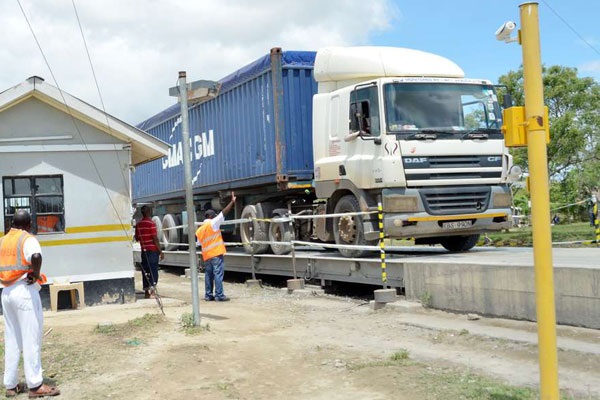
Malaba, Uganda | THE INDEPENDENT | Prime Minister Robinah Nabbanja has suspended the operations of the weighbridge at the Kenya Uganda Malaba border to help to reduce the pile-up of trucks at the border.
The Prime Minister made an impromptu visit at the Malaba border on a fact-finding mission to establish why the fuel prices have remained high yet the country had okayed trucks to enter the country even with Kenyan tests results.
The truck pile-up at the Uganda-Kenya border started three weeks ago following Uganda’s proposed review of the Regional Electronic Cargo and Drivers Tracking System (RECDTS), which allows COVID-19 testing after 14 days, to a shorter duration of seven days due to the high transmissibility of the Omicron variant.
As part of the change in policy, truckers were supposed to undergo mandatory COVID-19 testing which sparked a protest from drivers who parked their vehicles and blocked off the roads demanding that Uganda streamline its COVID-19 testing protocols in line with other EAC countries. Uganda charges 100,000 Shillings or 30 US Dollars for each test.
The drivers rejected the charges, jeopardizing trade of all the states that rely on the Northern Corridor transit route for imports and exports. They demanded that Uganda eliminate the COVID-19 test charges or do away with the mandatory testing like the other EAC states. While the dispute raged, there was a spike in fuel prices with a litre of petrol going for as high as 10,000 Shillings in some places.
The Ugandan government later abandoned the policy and said it will conduct free rapid COVID-19 testing as part of measures to clear the backlog.
The government also announced that negative results from national accredited laboratories in the respective member states would be recognized and asked authorities to implement an EAC Health Pass to enable quick verification of COVID-19 test certificates and vaccination status to ease movement of trucks into the country.
Despite of this directive, the cue of trucks coming to Uganda still remains at over 60 kilometers inside Kenya.
Nabanjja who was meeting the Malaba border officials on Friday was told by the acting Regional Manager of Uganda Revenue Authority Alfred Adriko that scarcity of staff both of URA and Uganda Bureau of Standards has been the biggest challenge to clearing the pile up of trucks at the border.
He said that that there are only four staff of URA and other government agencies who are handling the many truck drivers adding that most of the fuel trucks that pass Malaba are for transit to other country while Busia border mainly handles for Ugandan consumption.
Adriko also wondered why there is still scarcity of fuel in the country yet between January 1-19th URA released over 2,400 fuel tankers basically for domestic consumption and even during the truck driver’s protests, they had to divert traffic for fuel coming to Uganda through Busia boarder where there was no strike.
He also noted that the current problem at the border is the URA weigh bridge that a vehicle needs over 20 minutes to go through.
In her response, the prime minister suspended the operations of Weigh Bridge at Malaba as a measure to quicken the truck movement saying that the operations will only resume when the pile up has completely eased adding that to solve the current problem of truck pile up, government has instructed the minister of works, internal affairs and trade to peach camp at Malaba until border point until the fuel prices normalizes.
She also promised to institute an investigative body to establish the politics behind fuel in Uganda and if any company is caught on the wrong she promised to revoke their operating license. She added that now it is only the president who is supposed to issue statements that affect Uganda and her neighbors arguing that due to individual mistakes; Uganda has suffered a very big economic backlash.
Olotaba Okoth, the officer in charge External Security at the border says there is enough fuel in the country and government should institute independent investigations on different oil companies operating in the country to establish why and where they have been keeping fuel entering in the country.
He asked the prime minister to push government to enact a law that will see companies that hoard essential supplies heavily punished as such companies are presumably doing this with an intention to mobilize the populace against the government.
*****
URN
 The Independent Uganda: You get the Truth we Pay the Price
The Independent Uganda: You get the Truth we Pay the Price





